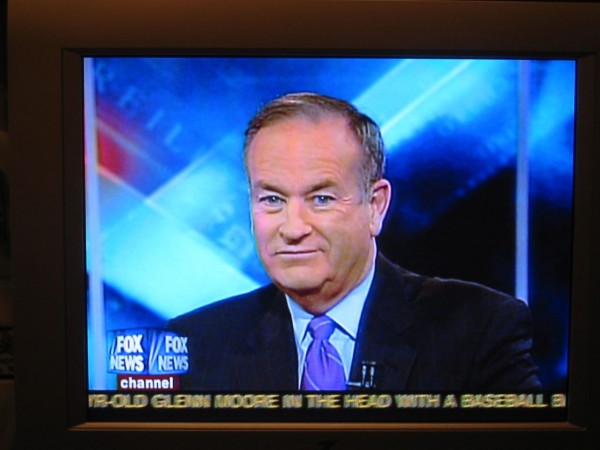
Originally posted in December 2015
Pundits regularly bemoan “incivility” in American politics, but the coarseness of political discourse has moved far beyond mere incivility, generally understood as showing lack of respect. The acrimony and intensity of much political speech and behavior today is best understood as outrage talk – political speech that uses theatrical rhetorical tactics such as ad hominem attacks, slippery slope argumentation, belittling, and mockery in an effort to provoke emotional responses from the audience such as anger, fear, and moral indignation.
Outrage Talk is Rampant
Deliberately inflammatory political speech is ubiquitous on talk radio, cable news analysis shows, and popular political blogs – whether it is “Hardball’s” Chris Matthews calling Senator Ted Cruz a “terrorist” who wants to “destroy… American government,” or Glenn Beck saying on his radio program that President Obama is a “Marxist revolutionary,” or Rush Limbaugh on his radio program labeling Sandra Fluke a “slut,” or Martin Bashir telling viewers on MSNBC that if the world was just, someone would defecate in Sarah Palin’s mouth, outrage-mongering is a genre of political media that has grown exponentially in the last 20 years.
Content analysis of 13 variants of outrage in ten top-rated shows on cable news, ten top-rated shows on talk radio and 20 widely read political blogs revealed a staggering number of outrage incidents. Fully 100 percent of the cable news analysis episodes contained outrage, while close to 90 percent of radio shows and roughly 80 percent of blog entries were characterized by outrage. What’s more, many individual episodes or posts included dozens of incidents. On the Fox and MSNBC shows that dominate the cable news-analysis landscape, outrage talk happens roughly every other minute during airtime not devoted to commercial advertisements.
Stoking Outrage is a Business Strategy
Polarization in society and politics is not an adequate explanation for the growing cadre of media hosts deploying outrage talk to stoke the emotions of their viewers, listeners, and readers. Indeed, polarization in elections and legislatures may be as much symptom as cause. The ascent of outrage says more about changing media technologies and regulatory guidelines and the broader culture than it does about the political views of most citizens.
Various changes have coalesced to make scream politics a lucrative, sound business strategy. Media regulation has been reduced, freeing outlets to say almost anything. Cable television multiplies outlets competing to grab eyeballs and ears in their own niches. And political life has become intensely personally focused. Together, these shifts encourage media strategies unimaginable even 20 years ago, when outlets used pleasant and inoffensive content to appeal to the broadest possible audiences. Nowadays, controversial, attention-grabbing content helps to draw an audience in a cluttered media landscape characterized by seemingly limitless options.
Nielsen, Arbitron, and other organizations charged with measuring media audiences suggest that the daily aggregate audience for programming featuring political outrage is 47 million Americans. Talk radio attracts the largest audience, with right-wing host Rush Limbaugh alone reaching some 14 million listeners a week. Close to 4,000 radio stations broadcast an all-talk format, triple the number in existence 15 years ago. Talk radio is much more successful with conservative audiences than with progressive listeners, especially political talk radio, the audience for which is 90% conservative.
Why are Audiences Attracted – Especially Conservatives?
What do audiences find appealing about outrage media? Through in-depth interviews with self-identified fans, we learned that these offerings function as safe havens for audience members increasingly uncomfortable with real-world political conversations. Face-to-face political talk generates fears of social rejection, social conflict, and the potential embarrassment of looking ill-informed, but people escape these worries when they listen to or watch charismatic hosts of outrage-based programs that help the viewer feel included. Hosts typically do this for their audiences by proffering pseudo-friendships, by flattering fans for their work ethic, moral judgment, and intellect, and by telling their audiences that they are informed people armed with “the truth.”
The function of outrage-spreading programs as personal safe havens may help explain why conservatives are dominant in this genre. Our interviews reveal that conservative fans feel they take a greater social risk when talking about politics with others, because their policy preferences – and they themselves – can end up being labeled “racist” in an era where intolerance is stigmatized in most public settings. In light of such risks, conservatives find political-media spaces for political “conversation” particularly valuable, places where feelings they may have can be aired and expressed without rebuke.We measured the incidence of outrage-based talk on left-leaning and right-leaning political media outlets. For programs with relatively low levels of outrage – two to five incidents per program – left-leaning and right-leaning programs or blog postings are roughly equal. But when it comes to programs or posts that invoke outrage more frequently, the outlets lean conservative, especially programs or posts with fifty or more expressions of outrage per episode.
Broader Damage to American Politics
For individual Americans, watching or listening to outrage talk may undermine tolerance, promote misunderstandings of public issues, and make politics seem unappealing. But damage is also visited on the U.S. political system as a whole when political opinion hosts incessantly stigmatize collaboration and compromise. When legislators enter into bipartisan negotiations they are often denounced on air as unprincipled sell-outs; and outrage-oriented outlets regularly boost primary-election candidates who challenge moderates, or even otherwise orthodox legislators, who compromise. Many politicians conclude it might be better to do nothing than to work on difficult governing decisions, especially those that require bipartisan cooperation.

 Research to Improve Policy: The Scholars Strategy Network seeks to improve public policy and strengthen democracy by organizing scholars working in America's colleges and universities. SSN's founding director is Theda Skocpol, Victor S. Thomas Professor of Government and Sociology at Harvard University.
Research to Improve Policy: The Scholars Strategy Network seeks to improve public policy and strengthen democracy by organizing scholars working in America's colleges and universities. SSN's founding director is Theda Skocpol, Victor S. Thomas Professor of Government and Sociology at Harvard University.